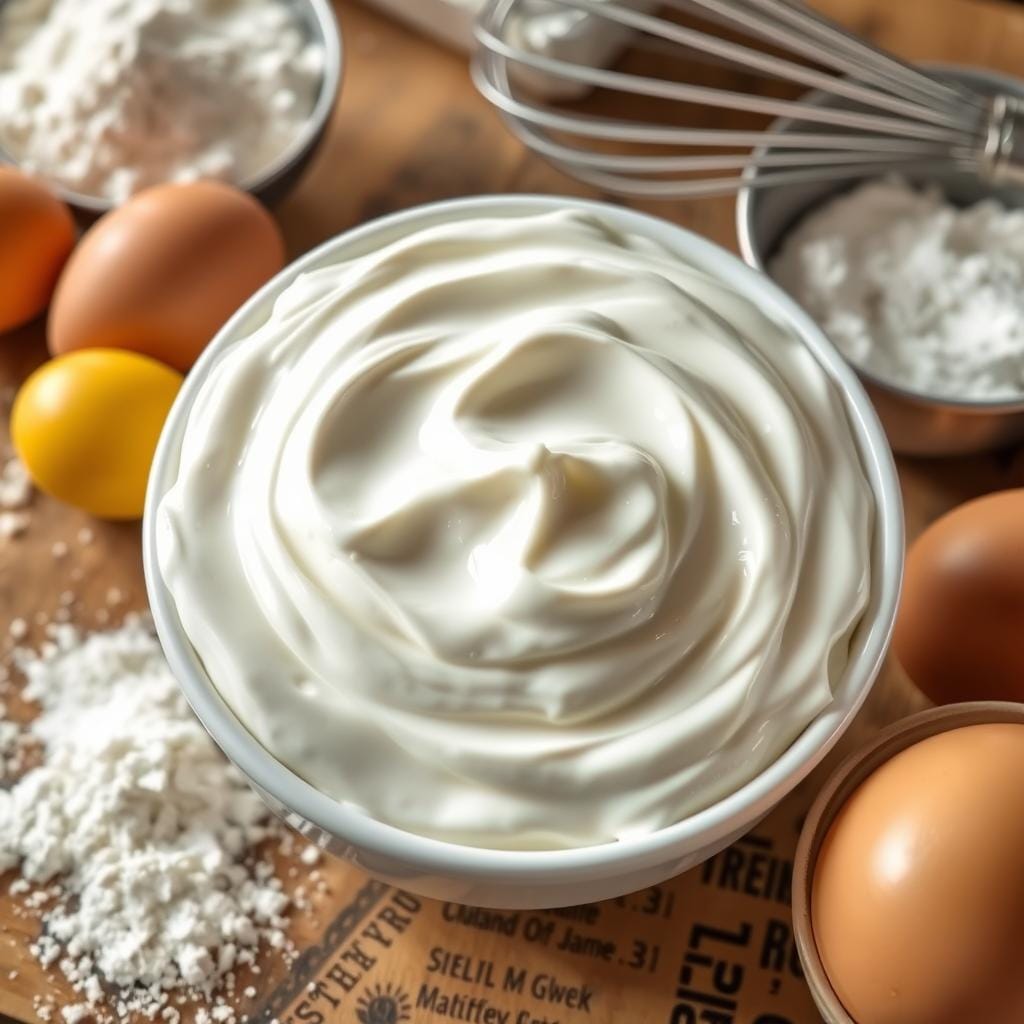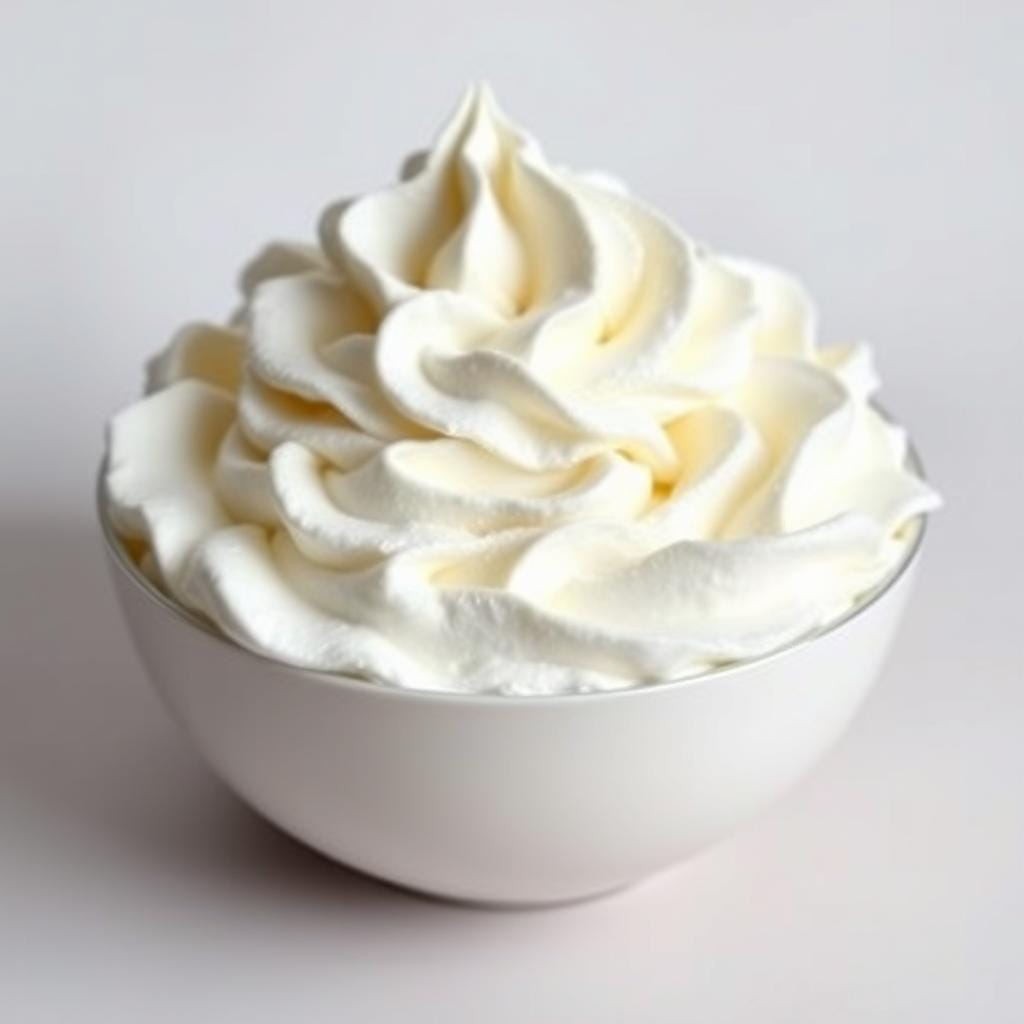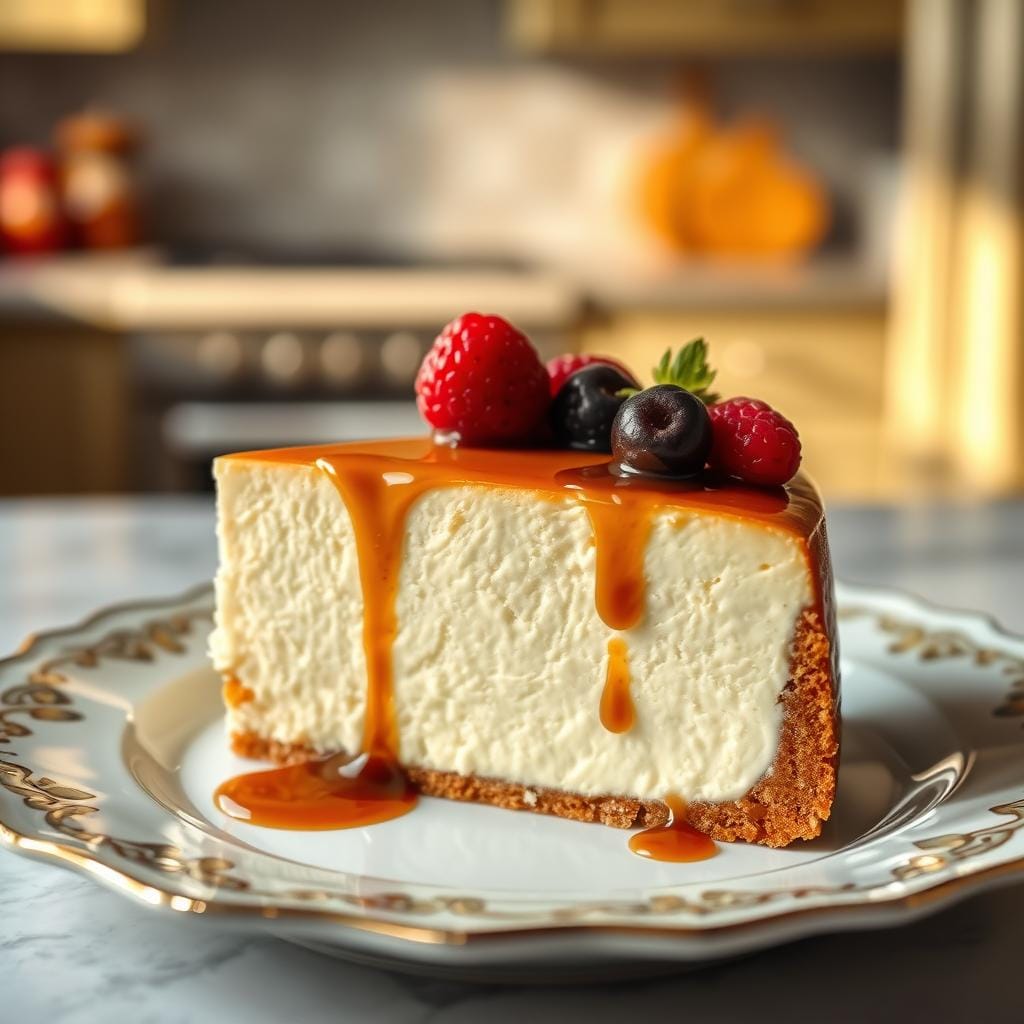Key Takeaways
- Sour cream and whipping cream have distinct properties that can significantly affect the texture and flavor of cheesecake.
- The fat content and whipping capabilities of each cream play a crucial role in determining the final cheesecake consistency.
- Proper temperature control and mixing techniques are essential when using different types of cream in cheesecake recipes.
- Adjusting sugar levels and other ingredients can help balance the flavors when substituting one cream for another.
- Understanding the storage and shelf life considerations for each cream can ensure your cheesecake maintains its perfect texture and taste.
So, which cream is the best for cheesecake? Find out as we explore the science and baking secrets of this long-standing debate.
Understanding the Role of Cream in Cheesecake Making
Choosing between sour cream and whipping cream greatly affects your cheesecake’s texture and taste. It’s important to know how these ingredients work to get the perfect smooth texture and rich flavor. We’ll look at how each cream type changes the final product and share baking tips to help you decide.
The Science Behind Creamy Texture
A creamy cheesecake comes from the right mix of ingredients and baking chemistry. Sour cream and whipping cream each add something special to the texture. Knowing how they work can help you get the smooth texture you want.
How Different Creams Affect Flavor Profile
The choice of cream also changes your cheesecake’s taste. Sour cream and whipping cream each have their own taste that can be mixed with other ingredients. This lets you make a cheesecake that tastes just right to you.
Learning about cream in cheesecake making helps you control texture and flavor. Whether you like sour cream’s tang or whipping cream’s creaminess, this knowledge lets you make the perfect cheesecake every time.
Explore the ultimate guide to cheesecake and discover more insights on how to achieve the perfectsmooth textureandrich flavorin your baked creations.
Properties of Sour Cream in Baking
Sour cream is a versatile ingredient in baking. It has a tangy taste and a smooth texture. These qualities make it a favorite for cream cheese desserts, especially cheesecake.
Using sour cream in baking adds moisture. Its high fat and protein levels create a rich, creamy texture. This is great for desserts like cheesecake, where a smooth texture is key.
Sour cream also adds a subtle tanginess. This tangy taste complements the sweetness of many desserts. It adds depth and complexity, making it a top choice for cream cheese desserts.
| Sour Cream Property | Baking Benefit |
|---|---|
| High Fat Content | Provides richness and creaminess |
| Protein Content | Helps retain moisture and create a smooth texture |
| Tangy Flavor | Adds depth and complexity to desserts |
Understanding sour cream’s properties helps bakers craft perfect cream cheese desserts. This includes the classic cheesecake.

Characteristics of Whipping Cream for Desserts
Choosing the right cream can change your desserts. Whipping cream is loved for its fluffy consistency and rich flavor. Knowing what makes whipping cream special can help you make amazing desserts.
Fat Content and Structure
Whipping cream has more fat than other creams, with 30% to 40% milk fat. This high fat content makes it creamy and light. It also whips up into a light, airy texture.
The fat in whipping cream is bigger and more fragile. This lets it trap air better when you whip it.
Whipping Properties and Stability
- Whipping cream’s high fat content and delicate structure make it perfect for fluffy and voluptuous desserts.
- When whipped, the cream holds its shape well. It’s great for topping cakes, pies, and other treats.
- The whipped cream stays stable even when baked. This ensures your desserts stay rich, creamy.
Understanding whipping cream’s special qualities is key to great baking. Its fluffy consistency and rich flavor can make your desserts stand out.

Is sour cream or whipping cream better for cheesecake?
Choosing between sour cream and whipping cream is key for a great cheesecake. Both are important for the right texture and taste. But which one is better? Let’s look at the good and bad of each to find the best cream for your cheesecake.
Sour cream adds a tangy flavor and a smooth texture to cheesecake. It balances the sweetness and makes the dessert richer and denser. Whipping cream, on the other hand, gives a lighter, fluffier texture. This is great for those who like a cheesecake that’s airy and delicate.
The choice between cream comparison depends on what you want your cheesecake to be like. Sour cream is best for a dense, rich cheesecake. Whipping cream is better for a lighter, more airy one.
Choosing between sour cream or whipping cream is up to you and what you want. Try both to see which one is perfect for your cheesecake recipes. This way, you can enjoy a creamy, indulgent dessert just the way you like it.
Impact on Cheesecake Texture and Consistency
Choosing between sour cream and whipping cream can change your cheesecake’s texture and feel. Knowing how these creams affect the cheesecake’s structure and moisture is key. This knowledge helps you get the smooth, fluffy texture you want.
Moisture Content Effects
Sour cream and whipping cream have different moisture levels. Sour cream makes the cheesecake creamier and smoother. Its extra liquid makes it dense and velvety. Whipping cream, with less moisture, makes the cheesecake lighter and fluffier.
Final Structure Analysis
The way these creams mix with other ingredients affects the cheesecake’s structure. Sour cream’s thickness helps keep the batter stable, making it denser. Whipping cream’s airiness can make the cheesecake more delicate but may need extra care to keep it together.
Choosing between sour cream and whipping cream depends on what you like and your baking skills. Try different mixes and methods to find the perfect cheesecake for you.
Flavor Profiles: How Each Cream Affects Taste
Choosing between sour cream and whipping cream is key for perfect cream cheese desserts. Each cream brings a unique taste that can either match or contrast with other ingredients. This choice greatly affects the cheesecake’s flavor.
Sour cream adds a tangy taste that balances the richness of cream cheese. It makes the dessert less sweet, perfect for those who like a bit of tartness. Whipping cream, on the other hand, adds a silky texture. It makes the cheesecake feel more indulgent and smooth.
“The choice between sour cream and whipping cream can make or break the flavor of your cheesecake. It’s all about finding the perfect balance to suit your taste preferences.”
Choosing the right cream depends on your taste and the cheesecake’s flavor you want. Try both to find the perfect mix that delights you and your guests.
Professional Baking Tips for Using Different Creams
Getting the perfect creamy texture in your cheesecake is key. The cream you choose is very important. Whether it’s sour cream or whipping cream, knowing how to mix and what temperature to use can make a big difference. This is crucial for your baking tips, cheesecake recipes, and the final smooth texture.
Temperature Considerations
The temperature of your cream affects your cheesecake’s texture and structure. Sour cream works best at room temperature. This ensures it blends well into the batter. Cold sour cream can cause lumps and an uneven texture.
Whipping cream, however, needs to be well-chilled. Cold whipping cream keeps its structure and whipping ability better.
Mixing Techniques
- When using sour cream, mix gently to avoid a dense and heavy batter.
- Whipping cream should be whipped just right before adding it to the batter. Overwhipping can make it grainy, while underwhipping can make it flat and dense.
- Adding the cream in stages helps blend it smoothly into the other ingredients for a creamy result.
By focusing on temperature and mixing, you can get the most out of sour cream or whipping cream in your cheesecake recipes. This will help you achieve the perfect smooth texture and delightful baking tips.
Common Mistakes to Avoid When Choosing Cream
Choosing the right cream is key to a perfect cheesecake. Many bakers make mistakes that affect the cheesecake’s texture and taste. Knowing these mistakes is important for a great cheesecake.
One big mistake is picking the wrong cream. Sour cream and whipping cream change how the cheesecake feels and tastes. Using the wrong one can make the cheesecake too dense or too rich.
Another mistake is not adjusting the recipe for the cream’s unique qualities. Sour cream, for example, has more moisture than whipping cream. This means you might need to change the amount of sugar and eggs. Not making these changes can make the cheesecake too dense or too soft.
Also, how you handle the cream is important. Overbeating whipping cream can make it grainy. Not whipping it enough can make it flat and dense. The same goes for sour cream; not mixing it right can make the cheesecake lumpy.
To bake a great cheesecake, you need to know the baking tips, cream comparison, and how each cream affects cheesecake recipes. By avoiding these mistakes, you can make a cheesecake that’s a joy to look at and eat.
| Mistake | Impact | Solution |
|---|---|---|
| Using the wrong type of cream | Affects texture and consistency | Choose the appropriate cream based on recipe requirements |
| Failing to adjust recipe for cream type | Results in an unbalanced cheesecake | Modify ingredients to accommodate the cream’s properties |
| Improper handling of cream | Impacts structure and distribution | Follow proper techniques for whipping and incorporating cream |
By avoiding these mistakes and using the right baking tips for your cream comparison in cheesecake recipes, you can make a dessert that’s a true delight.
Recipe Modifications Based on Cream Choice
The cream you choose can greatly affect your cheesecake. Whether it’s sour cream or whipping cream, adjusting your recipe is key. This ensures the right texture and flavor.
Adjusting Sugar Levels
Sour cream is less sweet than whipping cream. If using sour cream, you might need more sugar to balance its tanginess. For whipping cream, less sugar is better to avoid it being too sweet.
Balancing Other Ingredients
Changing the cream might also mean adjusting other ingredients. Sour cream has more moisture, so you might use less milk or cream cheese. With whipping cream, you might add more dairy to get the right creaminess.
Try different ingredient ratios and baking methods to perfect your cheesecake recipes. This way, you can enjoy a delicious cheesecake, whether it’s tangy or creamy.
“The key to mastering cream cheese desserts is understanding how different creams can impact the final product. By making simple adjustments, you can create a cheesecake that is perfectly tailored to your taste preferences.”
| Ingredient | Sour Cream Adjustment | Whipping Cream Adjustment |
|---|---|---|
| Sugar | Increase slightly | Decrease slightly |
| Other Dairy | Reduce to maintain consistency | Increase to achieve desired creaminess |
| Baking Technique | Adjust temperature and timing to prevent cracking | Monitor closely to prevent over-browning |
Remember these baking tips to adapt your cheesecake recipes for sour cream or whipping cream. This way, you can make an amazing dessert.
Storage and Shelf Life Considerations
The type of cream used in cheesecake affects its storage and shelf life. Knowing the difference between sour cream and whipping cream can help keep your cheesecake fresh. This ensures it stays delicious for a longer time.
Sour cream cheesecakes don’t last as long as those made with whipping cream. Sour cream’s high moisture content can cause the cheesecake to spoil faster. To keep sour cream cheesecakes fresh, chill them in the fridge and eat them within 3-5 days.
Whipping cream cheesecakes, however, can last longer. They can stay good up to 7 days in the fridge. This is because whipping cream has less moisture and more fat, keeping the cheesecake’s texture and taste better for longer.
It’s important to wrap or cover cheesecakes well, no matter the cream. This prevents them from drying out or picking up fridge odors. Use airtight containers or plastic wrap to keep them fresh.
When it comes to cheesecake toppings, their storage needs can differ. Fruit toppings, for example, spoil faster and need careful handling. It’s best to add these toppings right before serving for the best taste and freshness.
Understanding the cream comparison and baking tips for storage helps keep your cheesecake a delightful treat. It ensures your guests and loved ones enjoy it for a longer time.
Conclusion
Exploring sour cream and whipping cream for cheesecake shows they’re both great. The best choice depends on what you like and what you want your cheesecake to be like. If you want a rich, luscious texture, whipping cream might be for you. But if you prefer a softer, tangier cheesecake, sour cream could be the way to go.
It’s important to know how each cream affects your cheesecake. Understanding this can help you make the perfect cheesecake for your taste. The debate over sour cream or whipping cream is really about what you like. So, enjoy trying different recipes to find your favorite.
Whether you’re an experienced baker or new to cheesecakes, this article has useful info. It will help you make delicious cream-based desserts. Have fun finding your perfect cheesecake recipe and let your creativity flow.


